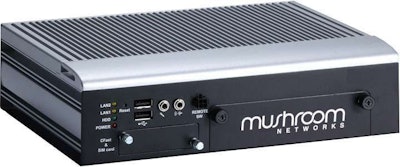Every morning I see mushrooms that have sprouted and grown taller than the surrounding grass in my yard, all in a matter of hours. Not until today did I equate high-speed mushrooms with transportation technology.
Mushrooms are the flowering fruits of an underground network of cells that communicate and coordinate their activities. The networks can be very large. In fact, the largest living organism on earth is thought to be a honey fungus living in the Blue Mountains of western Oregon that encompasses four square miles.
Similarly, it takes a lot of data and coordination to achieve safe, profitable, on-time and damage-free deliveries day after day. Much of the information that managers and drivers need to plan and execute these activities is captured by mobile computers and sensors that share an Internet connection to software applications in the cloud.
 The Portabella 7200i
The Portabella 7200iTruthfully, the only reason mushrooms entered my mind is that a San Diego-based company named Mushroom Networks introduced a portable, high-speed Internet appliance called Portabella (with “Porta” short for portable) that could have an impact on the transportation industry. Here’s why:
Traditionally, fleets have subscribed to a single mobile communications provider to have a satellite or cellular connection to their vehicles. In some cases, the computing device in the cab can switch between cellular, satellite and Wi-Fi where available to extend coverage and keep costs down.
Portabella works by pooling data plans from up to six different wireless carriers to deliver the best combination of speed and reliable cellular coverage. With the pooling or sharing of data plans, installing multiple sim cards in one device is not more expensive than subscribing to a single data plan for each truck, and you can do things that are not possible otherwise due to bandwidth limitations of a single connection, says Dr. Cahit Akin, co-founder and chief executive of Mushroom Networks.
All major wireless carriers like Verizon, AT&T and T-Mobile allow subscribers to pool or share data plans among multiple devices. Whether you have one line or six lines, you pay the same monthly rate with pricing based on data usage rather than the number of sim cards activated.
The Portabella can be used as a mobile Wi-Fi hotspot for applications and sensors that need an Internet connection at the vehicle level, and to maintain reliable, high-speed nationwide cellular connection to cloud-based fleet management applications, he says. Some of the breakthrough possibilities include live video conferencing with drivers, pushing out training inside or outside the cab, streaming live video from an accident scene, and allowing drivers to connect their personal devices to a high-speed mobile Wi-Fi hotspot.
 Dr. Cahit Akin, co-founder and CEO of Mushroom Networks
Dr. Cahit Akin, co-founder and CEO of Mushroom NetworksAkin describes the Portabella appliance as “a cube” that is installed in a vehicle. The cube is about the size of a household cable modem but ruggedized to withstand extreme temperatures and vibration. Multiple modems in this cube create a multi-lane wireless highway. If one traffic lane gets congested or starts to suffer, the device pushes the wireless traffic towards the sim cards that are performing better, he says.
The Portabella uses a patented technology called Broadband Bonding to spread the traffic among all sim cards simultaneously and coordinate the sending and receiving of packets from multiple wireless networks. Suppose a fleet has 10 trucks. Rather than purchase 100 Gigabytes worth of data per month from Verizon, the fleet could purchase 25 Gigabytes of data from four different wireless providers (Verizon, AT&T, T-Mobile and Sprint) and utilize all of these networks at once to maximize coverage and speed.
If four cards each had uniform speeds of 10 megabytes per second (mbps), the data streaming into and out of a truck would be four times faster at 40 mbps. If one of the cards started having issues, the system could continue streaming with the remaining sim cards at 30 mbps.
“The goal is to optimize the user experience,” he says. “We intelligently orchestrate the modems to increase speed and reliability.”
The Portabella comes in two different models. The 5200i supports sim slots for 3 embedded modems, and the Portabella 7100i supports up to 6 embedded modems. Mushroom Networks has agreements in place with value added resellers, many of which include installation of devices as part of the pricing. Because of these agreements Cahit declined to say what the technology costs, though my guess is it’s more than a thousand dollars for the appliance.
As the amount of data continues to increase, products that deliver mobile broadband Internet access will become more widespread and cost affordable for motor carriers. It’s easy to imagine Broadband Bonding technology growing in the trucking space just like mushrooms in damp, fertile soil.











